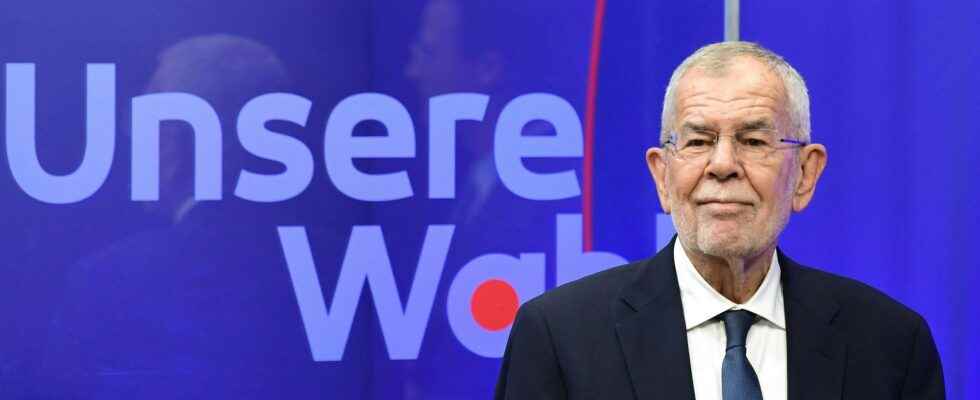The outgoing Austrian president, environmentalist Alexander Van der Bellen, was re-elected on Sunday on the promise of stability amid the energy crisis. Supported by a broad spectrum of the political class, the 78-year-old candidate won without surprise in the first round with 56.1% of the vote, according to the latest projections from the SORA institute. The official result should not be known until Monday. “Now is the time to look ahead and get down to heavy work,” commented Alexander Van der Bellen in a video message posted on Facebook.
A weakened far-right
In the alpine country of 9 million inhabitants, 6.4 million voters – including the Austro-American Arnold Schwarzenegger, strong support of the president – were called to the polls. “I am in favor of stability,” Monika Gregor, a 73-year-old retiree, told AFP, calling the president a “very intelligent” man.
But others preferred to give their voice to candidates from civil society. Alexander Nittmann, a 35-year-old computer developer, chose punk singer Dominik Wlazny (8.4% of the vote), the same age as him and founder of the “Beer Party”. “I think a bit of fresh air in politics does no harm,” he explained, deeming his campaign serious behind the humor.
The far-right FPÖ party, which almost won against Alexander Van der Bellen in 2016 and dreamed of revenge this year, is far behind this time. Walter Rosenkranz, a sixty-year-old little known to the general public, won 17.9% of the vote on Sunday, according to SORA estimates, against the tide of recent elections in Sweden and Italy. Corruption cases have caused Austria’s notorious extreme right to lose ground. Six years ago, she was the first in Europe to come close to victory in a presidential election.
Founded by former Nazis, the FPÖ finally lost with more than 46% of the vote, epilogue of a ballot with twists and turns that had kept Brussels and Austria’s western partners in suspense. If the party had then acceded to the government by forming a coalition with the conservatives of the young Sebastian Kurz, it had to leave power in 2019 after an incredible scandal and has never since regained its past glory.
A sober and clear campaign, without “turbulence”
Faced with these turmoil and the succession of chancellors, Alexander Van der Bellen, whose function is in practice essentially ceremonial, was able to guarantee the continuity of the state. He was thus able to present himself as “the only one who can avoid chaos”, had commented before the election the political scientist Thomas Hofer, interviewed by AFP. This pro-European also passes for “integrity”, underlines Julia Partheymüller, of the University of Vienna, which is “highly appreciated” in comparison with the “multiple crises facing many European countries”.
He led a sober campaign, advocating “clarity” and “competence” in order to “cross the turbulence as calmly as possible”. His atypical profile, however, in no way guaranteed him such a political destiny. Austere, a little stiff even, agnostic married twice in Catholic land, the former boss of the Greens and dean of the faculty of economics in Vienna has been able to forget his strong anchoring on the left to bring people together.
Tongue-in-cheek, heavy smoker with an eternal three-day beard, he is now happy to have himself photographed in loden – a traditional alpine jacket – at the foot of the glaciers to convince of his patriotism. Because an extremely rare environmentalist at the head of a democracy, he is also the son of refugees and has inherited an exotic Batavian surname: his Protestant family emigrated from the Netherlands to Russia in the 18th century. His father, an aristocrat, and his Estonian mother joined Vienna during the Second World War before moving to Tyrol, fleeing the arrival of the Red Army.
